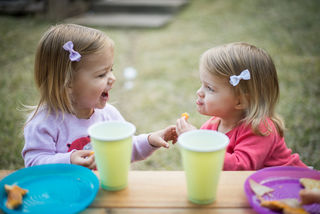Altruism
New Research Shows Even Hungry Babies Will Share Their Food
A new study found altruistic food-sharing behavior among 19-month-olds
Posted February 4, 2020 Reviewed by Daniel Lyons M.A.
Babies will spontaneously share food with hungry strangers, even when they are hungry themselves, according to a new study published this month in Scientific Reports.
In the study, the researchers first conducted an experiment with 19-month-olds about 75 minutes after their last snack or meal. In the experiment, an unfamiliar adult reached for pieces of fresh fruit that had been placed on a tray in front of the child, and the child could choose to either share the fruit with the adult or keep the fruit and eat it themselves. Almost 60% of the children shared at least one of four fruits with the adult.

In a follow-up experiment, the researchers had the children's parents bring them in just prior to their next scheduled snack or meal, so on average, it had been more than 130 minutes since they last ate.
The researchers were curious whether these children, who were presumably hungry themselves by this point, would still share desirable food with someone in need.
The results showed that almost 40% of the children were willing to share at least one piece of fruit with the adult who reached for the food. While this percentage was smaller than in the previous test, it was nevertheless a sizable amount.
These results demonstrate that children as young as one year old are capable of engaging in unprompted altruistic sharing, even when they have motivation (such as hunger) to be stingy.
The researchers note that this appears to be a uniquely human behavior — or at least, it has not been well documented in animals. While some animals do share food with kinship groups, no study has demonstrated the behavior among unrelated animals.
What explains why we humans share so freely compared with our animal brethren? The study suggests that common childrearing practices that emphasize the importance of sharing contribute to the children's observed willingness to help others in need.
References
Barragan, R.C., Brooks, R. & Meltzoff, A.N. Altruistic food sharing behavior by human infants after a hunger manipulation. Sci Rep 10, 1785 (2020). https://doi.org/10.1038/s41598-020-58645-9


